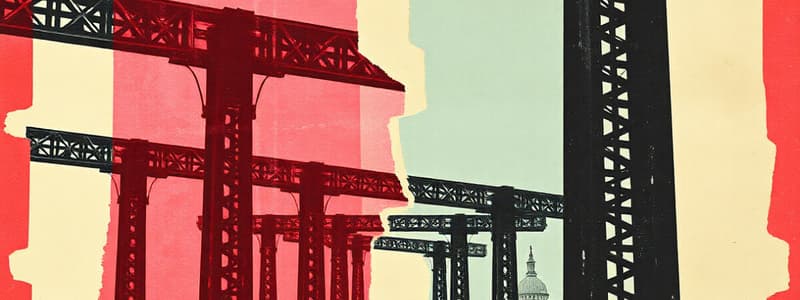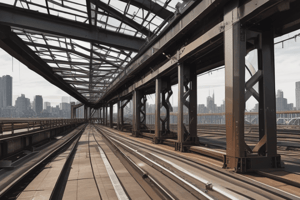Podcast
Questions and Answers
What is a key consideration when designing simple beams that are laterally supported?
What is a key consideration when designing simple beams that are laterally supported?
- The material used must always be timber.
- Beams should be designed without considering bending moments.
- Only concentrated loads can be applied.
- Lateral movement must be restricted by bracing. (correct)
What typically characterizes a simple beam in structural design?
What typically characterizes a simple beam in structural design?
- It can be freely moving throughout its span.
- It is only supported at one end.
- It is fixed at both ends.
- It is supported at both ends. (correct)
In the bending design of a laterally supported beam, where does the maximum bending moment occur?
In the bending design of a laterally supported beam, where does the maximum bending moment occur?
- At one-third points along the beam.
- At the ends of the beam.
- It is evenly distributed along the beam's length.
- At the mid-span of the beam. (correct)
What formula represents the maximum bending moment for a simply supported beam under uniform loading?
What formula represents the maximum bending moment for a simply supported beam under uniform loading?
Which statement is true regarding laterally supported beams?
Which statement is true regarding laterally supported beams?
Which design assumption is often made for laterally supported simple beams?
Which design assumption is often made for laterally supported simple beams?
What effect does lateral support have on a beam's performance under load?
What effect does lateral support have on a beam's performance under load?
Which of the following types of supports is typically associated with simple beams?
Which of the following types of supports is typically associated with simple beams?
What is a significant risk for beams without lateral support?
What is a significant risk for beams without lateral support?
Which material can be used for laterally supported simple beams?
Which material can be used for laterally supported simple beams?
What is the formula for the maximum bending moment for a concentrated load at the mid-span of a beam?
What is the formula for the maximum bending moment for a concentrated load at the mid-span of a beam?
How is the required section modulus calculated for a beam under a bending moment?
How is the required section modulus calculated for a beam under a bending moment?
What is the maximum shear force for a beam with a concentrated load at mid-span?
What is the maximum shear force for a beam with a concentrated load at mid-span?
What is the allowable shear stress for steel usually defined as?
What is the allowable shear stress for steel usually defined as?
How should the maximum deflection of a simple beam be checked for serviceability?
How should the maximum deflection of a simple beam be checked for serviceability?
In the design of compound beams, what must be considered due to the interaction of individual components?
In the design of compound beams, what must be considered due to the interaction of individual components?
Which equation represents the relationship of shear stress in a beam?
Which equation represents the relationship of shear stress in a beam?
What factors mainly affect the deflection of a simple beam?
What factors mainly affect the deflection of a simple beam?
Why is buckling resistance critical for compound beams?
Why is buckling resistance critical for compound beams?
What is a key design step for connections in compound beams?
What is a key design step for connections in compound beams?
Flashcards are hidden until you start studying
Study Notes
Design of Simple and Compound Beams (Laterally Supported)
- Laterally supported beams are braced to prevent sideways deflection, which is crucial for stability and avoiding torsional buckling.
- Simple beams are supported at both ends, typically with pinned or roller supports.
- Compound beams consist of two or more elements joined together, often with bolts, rivets, or welds.
Design of Simple Beams (Laterally Supported)
-
Design assumptions:
- Lateral support prevents lateral displacement and twisting.
- Uniform loading is often assumed for simplicity.
- Steel is a common material in this context, though the principles apply to other materials.
-
Bending Design:
- Maximum bending moment for a uniformly distributed load (w) over a span (L): (M_{max} = \frac{wL^2}{8})
- Maximum bending moment for a concentrated load (P) at mid-span: (M_{max} = \frac{P \cdot L}{4})
- Bending stress: (\sigma_b = \frac{M_{max}}{S}).
- Section modulus (S) should be selected to ensure bending stress does not exceed the yield strength ((f_y)).
- Required section modulus: (S_{req} = \frac{M_{max}}{f_y})
-
Shear Design:
- Maximum shear force for a uniformly distributed load: (V_{max} = \frac{wL}{2})
- Maximum shear force for a concentrated load: (V_{max} = \frac{P}{2})
- Shear stress: (\tau = \frac{V_{max}}{A})
- Allowable shear stress for steel is commonly (f_{v} = 0.6 \cdot f_y).
-
Deflection Check:
- Maximum deflection for a simple beam under a uniform load: (\delta_{max} = \frac{5wL^4}{384EI})
- Deflection limits for serviceability are based on design codes (e.g., IS 800, Eurocodes). A common limit is (\delta_{max} \leq \frac{L}{250})
Design of Compound Beams (Laterally Supported)
-
Key Design Considerations:
- Load distribution: The load is shared between components based on their stiffness and moment of inertia.
- Buckling resistance is critical for compound beams spanning longer distances.
- Shear flow affects load transfer in compound beams with connected plates.
-
Bending Design:
- Similar to simple beams, but the load is distributed across the individual elements.
- Moment resistance is determined by the section modulus and moment of inertia of each element.
-
Shear Design:
- Shear connectors (bolts or welds) are often required for efficient load transfer.
-
Connection Design:
- Connections must be designed to safely transfer loads between components.
- Shear flow and stress distribution are especially important in plate connections.
-
Deflection Check:
- Similar to simple beams, but considering the combined stiffness of the components.
Studying That Suits You
Use AI to generate personalized quizzes and flashcards to suit your learning preferences.



